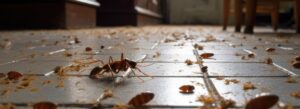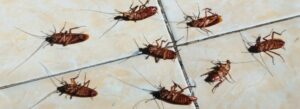Your Ultimate Guide to Long-Term Wasp Prevention and Control in Kent
Wasps aren’t just a seasonal nuisance—they’re a persistent threat if left unmanaged. If you’ve ever asked, “How do I permanently get rid of wasps?” you’re not alone. In Kent, especially during spring and summer, residents in areas like Ashford, Canterbury, Maidstone, and Thanet face ongoing issues with wasps returning year after year.
The key to stopping wasps from coming back is not just removal—but elimination, prevention, and deterrence.
In this guide, Innovation Pest Control reveals the complete approach to permanent wasp control, breaking down professional techniques, long-term deterrents, and how to make your property wasp-proof for good.
Why Wasps Keep Coming Back
Wasp colonies follow seasonal cycles, and each year they return to safe, familiar nesting areas. If a nest has ever been built on your property, there’s a high chance queen wasps will return after hibernation to build again in the same spot or nearby.
Here’s why they keep coming back:
- Old nest sites emit pheromone trails
- Gaps in eaves, vents, or soffits offer easy access
- Sweets, food waste, and compost attract foraging wasps
- Lack of prevention measures leaves your home vulnerable
Fun fact: A single queen can produce up to 10,000 wasps in one season—preventing her from settling is half the battle.
Some wasps, such as Vespula vulgaris (the common wasp) and Vespula germanica (the German wasp), are especially persistent. These aggressive species are known for building nests in porches, lofts, trees, and wall cavities.
Step 1: Eliminate Existing Nests Thoroughly
The first step is proper nest treatment and destruction. A leftover or untreated nest (even inactive) can invite return activity.
Why Professional Removal Is Key
DIY sprays may kill some wasps but won’t:
- Reach the queen
- Destroy pheromone trails
- Prevent reoccupation
At Innovation Pest Control, we use regulated insecticide and foam treatments that neutralise the entire colony and disrupt scent trails.
Whether the nest is in a loft, cavity wall, under decking, or inside a chimney, we use safe access equipment and advanced tools to ensure full elimination.
We also inspect nearby zones, because sometimes paper wasps and mud wasps (which build with soil and mud) form undetected secondary nests. These satellite colonies can carry on the cycle if left alone.
Step 2: Block Future Access Points
Once nests are removed, it’s time to seal up entry routes and remove attractive features.
Key Areas to Inspect:
- Cracks and holes in brickwork
- Unsealed air bricks or soffit vents
- Gaps around fascias, cladding, or rooflines
- Broken window screens or vent covers
Pro Tip: Wasps only need a hole 3–5mm wide to gain entry. Even the size of a pencil tip is enough.
Innovation Pest Control offers professional proofing services to seal problem zones using wasp-proof mesh, caulk, and expanding sealants.
We also check for golf ball-sized access points around the property, a common tell-tale sign of nesting activity. These gaps often occur near bird control netting, sheds, or timber cladding.
Step 3: Target the Queen During Hibernation
Queen wasps survive winter by hiding in:
- Lofts
- Garden sheds
- Wall cavities
- Behind bird control netting
- Inside furniture or garages
They emerge in early spring (March to May) to start building new nests. To break the cycle, you must target queen wasps early.
How to Reduce Queen Survival:
- Use traps baited with juice, sugar water or meat
- Apply residual insecticide to overwintering sites
- Keep lofts and outbuildings sealed
Some wasps like paper wasps build umbrella-like nests under roof eaves, often attached to wood, brick, or metal.
Traps can be made with a bottle and filled with attractants such as sugar water or vinegar mixed with juice—these catch queens before they build.
Step 4: Ongoing Deterrents and Maintenance
To keep wasps away permanently, consistency is key.
Ongoing deterrents include:
- Spraying peppermint, vinegar, or eucalyptus essential oil near nesting zones
- Hanging fake wasp nests (decoys)
- Cleaning up fallen fruit, sugary spills, and uncovered bins
- Avoiding planting herbs and sweet-smelling flowers near entryways
- Removing still water (e.g. trays, pots, gutters) that attract thirsty wasps
While wasps are part of the Hymenoptera order and serve a role in the ecosystem—controlling gnat, fly, and small insect populations—they become a health risk when nesting near homes.
Our experts also monitor for crossover pest issues, such as mosquito habitats forming near plant pots, soil beds, or vegetable patches.
What If Wasps Are Inside the House?
Wasps can sometimes enter through:
- Extractor vents
- Chimneys
- Cracks in walls or windows
In winter, paper wasps may enter structures looking for warmth. These sluggish wasps might seem dead, but they’re in a torpid state from hibernation.
Don’t attempt to treat hidden wasps without protection—disturbed colonies can swarm, increasing the risk of allergy, anaphylaxis, and stinger injury.
If you see signs of active wasps and can’t locate the nest, call us for a free quote and site inspection.
How Innovation Pest Control Delivers Long-Term Results
We provide end-to-end support:
- Professional identification of wasp species (especially vespula vulgaris, vespula germanica, and paper wasps)
- Environmentally conscious treatments that minimise harm to pollinators like bumblebees and avoid damage to nearby plants and flowers
- Non-toxic options when dealing near pets or gardens
- Integration with broader pest plans including WAF (Web Application Firewall) logic for digital property protection [if applicable to business clients’ online booking systems or pest tracking portals]
We’ve even collaborated with beekeepers when nests were misidentified as beehives, ensuring pollinators aren’t harmed.
Our mission is simple: eliminate the threat, prevent return, and keep Kent safe.
FAQs: Permanent Wasp Removal
Do essential oils work against wasps?
Yes—peppermint, eucalyptus, and vinegar-based sprays can deter wasps from nesting. We recommend applying near soffits, bins, and porches.
What’s the best natural repellent for wasps?
A spray of vinegar and water or a few drops of peppermint oil in water sprayed around entry points can discourage nesting.
What’s the difference between a paper wasp and a yellowjacket?
Paper wasps build open, umbrella-style nests and are less aggressive. Yellowjackets (like vespula vulgaris and vespula germanica) are more aggressive and build enclosed nests.
Is professional removal better than traps?
Yes. Traps can reduce numbers, but only full treatment ensures colony elimination and prevention. We provide a free quote to assess the safest and most effective plan.
Can I pour insecticide or liquid into a nest?
We strongly advise against DIY approaches. Spraying or pouring any liquid into a nest may provoke an aggressive response.
Final Thoughts: How Do I Permanently Get Rid of Wasps?
The best way to stop wasps for good is to combine professional removal with prevention:
✅ Eliminate nests (especially vespula germanica and paper wasps) ✅ Seal all entry points and nesting sites ✅ Use natural deterrents like essential oils, vinegar, or decoy nests ✅ Maintain property hygiene and garden tidiness ✅ Get expert help for a guaranteed result
Book your service now with Innovation Pest Control and enjoy a wasp-free future.
📞 Call us or request your free quote today: innovationpestcontrol.co.uk
Innovation Pest Control Trusted Across Kent for Safe, Permanent Wasp Elimination
Additional FAQs: Expert Answers to Your Top Wasp Questions
How do I kill wasps without using insecticides?
You can use natural deterrents like peppermint oil, vinegar sprays, or soapy water traps. Essential oils can be effective at repelling wasps when applied to entry points and common nesting zones.
What is the best way to eliminate wasp nests?
Professional foam or dust treatments applied directly into the nest during low activity hours (early morning or evening) are most effective.
Can I permanently remove wasps from my attic?
Yes. Permanent removal includes eliminating any active nests, sealing access points, and using deterrents to prevent re-entry.
How do I prevent wasps from building nests on my porch?
Spray vinegar, peppermint, or eucalyptus oil in corners. Hang decoy nests and ensure no food or bin smells are nearby.
What repels wasps naturally and effectively?
Essential oils like peppermint, clove, and lemongrass repel wasps. Vinegar, citrus, and decoy nests also discourage them.
How do I get rid of wasps in my garden?
Keep plants trimmed, remove sweet fallen fruit, and use traps baited with sugar, juice, or vinegar. Avoid overwatering, which creates mosquito habitats too.
Can diatomaceous earth kill wasps?
Diatomaceous earth is not ideal for wasps. It’s more effective against crawling insects like ants and fleas.
How do I exclude wasps from my home?
Seal up cracks, gaps in soffits, and install fine mesh over vents and chimneys. Keep windows screened and use essential oil sprays.
What is the best wasp trap to buy?
Look for baited traps with refillable attractants like meat, juice, or sugar water. Some traps specifically catch queen wasps early in the season.
How do I make a homemade wasp trap?
Cut a plastic bottle in half, invert the top, and bait it with sugar water, vinegar, or fruit juice. Wasps enter but can’t escape.
Can I drown wasps in soapy water?
Yes. Wasps can be killed using a bucket of water with dish soap. The soap breaks surface tension and suffocates them.
How do I keep wasps away from my trash cans?
Keep lids sealed tightly, rinse recyclables, and spray the outside with peppermint or eucalyptus oil.
What essential oils repel wasps?
Peppermint, eucalyptus, lemongrass, clove, and citronella oils are effective natural repellents. Reapply every few days.
How do I get rid of wasp nests in my walls?
Use a dust insecticide through drilled holes under professional guidance. Never block entry while the nest is active.
Can I use a dust or foam to kill wasps?
Yes. Foams are ideal for visible nests; dusts work for wall voids. Both should be applied with caution or by professionals.
How do I prevent wasps from entering my house?
Install mesh over vents, seal cracks, and spray natural repellents at entry points. Keep windows and doors closed.
What is the best way to kill wasp queens?
Use traps in early spring (March–May) baited with sugar, juice, or meat to catch queens before they nest.
Can wasp traps catch queen wasps?
Yes—especially in early spring. Place traps near eaves, sheds, or attic access points to intercept queens.
How do I get rid of wasps in my eaves?
Apply repellent sprays, remove old nests, and install decoy nests. Use foam treatments for active infestations.
What is the best way to eliminate wasps in my yard?
Clear garden waste, seal compost bins, avoid sugary drinks left outside, and place traps or deterrents in shaded areas.







